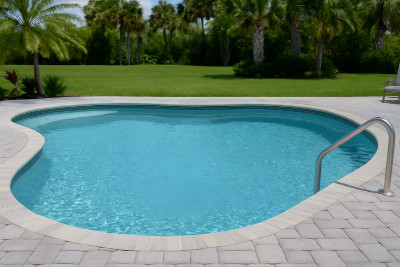Converting to a Saltwater Pool in Southwest Florida: What You Need to Know
Mon, June 30th, 2025
Saltwater pools are quickly becoming the go-to option for pool owners across Southwest Florida—and for good reason. If you’ve ever dreamed of softer water, less maintenance, and fewer harsh chemicals, a saltwater system might be exactly what your backyard oasis needs.
But before you make the switch, it’s important to understand what the conversion process involves, what changes to expect, and how to keep your system running smoothly once it’s installed. Here’s everything you need to know before converting your traditional chlorine pool to saltwater.
What Is Saltwater Pool Conversion, Exactly?
Let’s start by clearing up a common misconception: saltwater pools still use chlorine. The difference lies in how it’s added.
Instead of manually adding chlorine tablets or liquid, a saltwater system uses a piece of equipment called a salt chlorine generator (or salt cell). This device converts dissolved salt into chlorine through a process called electrolysis. It continuously creates chlorine at low, steady levels to sanitize the pool water.
The conversion process typically includes:
- Installing the salt chlorine generator and control panel
- Adding a specific amount of pool-grade salt to the water
- Ensuring your water chemistry is properly balanced before activation
You don’t need to drain your pool or do anything drastic. With the right professional support, the switch can be seamless.
Is Your Existing Equipment Salt-Compatible?
One of the first things to consider is whether your current pool system is compatible with saltwater. While many modern pools are already salt-friendly, certain older components—like heaters, ladders, light fixtures, or pool surfaces—may require upgrades or protective measures.
Saltwater is far less corrosive than ocean water, but over time, it can still affect some metal parts or cause surface wear if the pool isn't properly maintained.
When you work with a trusted pool service provider like Sweetwater Pool Service, we’ll inspect your equipment to determine what’s compatible and make recommendations for any needed adjustments. It’s all about long-term performance and protecting your investment.
Will the Water Really Feel Different?
Yes—and it’s one of the first things people notice after switching.
Saltwater pool water has a softer, silkier feel compared to traditional chlorine-treated pools. Swimmers often say it’s gentler on their eyes, skin, and hair. People with skin sensitivities, eczema, or allergies especially tend to appreciate the difference.
Another perk? No more strong chemical smell or chlorine "sting." And your swimsuits, pool liners, and outdoor furniture may last longer with fewer harsh chemicals in the mix.
How Salty Is a Saltwater Pool?
A common worry is whether a saltwater pool will feel like swimming in the ocean. The answer: not even close.
Saltwater pools typically contain about 1/10 the salinity of ocean water—just enough to provide a soft feel and allow the salt cell to produce chlorine. You likely won’t even taste it, and it’s completely safe for children and pets who might accidentally swallow a bit of water.
In fact, many families prefer saltwater pools for this very reason: they feel natural and safe, without the overpowering scent and dryness of traditional chlorine.
Is Maintenance Really Easier?
Saltwater pools are often praised for being lower maintenance—but “low” doesn’t mean “none.” Here’s what you can expect:
- The salt cell will need periodic cleaning, usually every few months, depending on use and water hardness.
- Water testing is still important, though less frequent. You’ll still monitor pH, alkalinity, and stabilizer levels.
- Salt levels need to be checked occasionally and adjusted after heavy rain, backwashing, or splash-out.
So yes, maintenance becomes more manageable—but regular care is still essential. The benefit is that the system handles the day-to-day sanitizing for you, reducing your workload and minimizing chemical fluctuations.
Will My Pool Look Any Different?
From the outside, your pool will look the same. What changes is the clarity of the water and the comfort of the swim.
Over time, many pool owners report fewer algae issues and clearer water due to the steady chlorine output. That’s especially helpful in Florida’s hot, humid climate where algae blooms can happen fast.
The only visible addition is the salt chlorine generator, usually installed near your pump and filter system. It’s sleek, discreet, and easy to manage with the help of your pool technician.
What About Environmental Impact?
Saltwater systems can be an eco-friendlier choice when properly maintained. Because they reduce the need for transporting, storing, and manually adding harsh chemicals, they create less chemical runoff and fewer byproducts entering the environment. Plus, there’s no need for those big buckets or strong-smelling chlorine containers cluttering up your pool area.
Should You DIY or Hire a Pro?
While there are online kits promising an “easy” DIY conversion, saltwater systems involve both electrical components and complex water chemistry. Improper installation can lead to long-term issues—or worse, damage your pool’s plumbing or filtration system.
A professional installer will:
- Ensure your equipment is compatible
- Calibrate your system for Florida’s heat and humidity
- Balance your water for optimal cell performance
- Show you how to care for your new setup
It’s one of those cases where getting it done right the first time saves you time, stress, and money down the road.
Why Southwest Florida Is the Perfect Place for Saltwater
Florida homeowners get more use out of their pools than almost anywhere else in the country. That makes ease of use, skin comfort, and water quality more important than ever.
Saltwater systems work beautifully in warm climates, and when paired with a professional maintenance plan, they can offer a luxurious, hassle-free swimming experience all year long.
Converting your chlorine pool to saltwater isn’t just a trend—it’s a smart move for comfort, convenience, and long-term pool enjoyment. But it’s not a one-size-fits-all solution, and it’s important to understand the ins and outs before diving in.
At Sweetwater Pool Service, we specialize in helping Southwest Florida homeowners upgrade with confidence. From assessing your current system to handling installation and ongoing care, we’ll guide you through every step of the process.
→ Ready to explore saltwater conversion for your pool? Let’s talk. Contact Sweetwater Pool Service today for a personalized consultation.



